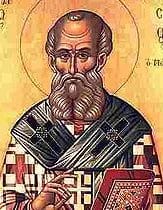Central to the proclamation of the gospel in the first century A. D. was the confession that Jesus is Lord (Romans 10:9). As one probes what the term ‘Lord’ means for the New Testament writers, it is soon clear that there is more here than initially meets the eye. To confess Jesus as Lord is to recognize his sovereign authority. He has, for instance, the right to bestow the Spirit on whomever he pleases (Acts 2:32-36). But only God can so give the Spirit. As Lord, he is also the rightful recipient of prayer (see Acts 7:59; 2 Corinthians 12:8). Again, as every Jew knew, prayer and worship are to be directed to God alone.
In the Septuagint (the Greek translation of the Old Testament that was widely used by the early church) the term ‘Lord’ (kyrios) is the term regularly used to translate the very name of God, Jehovah, or as it is written today, Yahweh. Yet, this term ‘Lord’ is the normal way in which the Greek New Testament refers to Jesus. In the light of these and other aspects of the New Testament’s witness to Christ, the confession that Jesus is Lord must mean that Jesus shares the name and nature, authority and power, holiness and majesty, of the one true and living God.
Arius
Until the beginning of the fourth century, this view of Christ as fully divine was largely unquestioned in the church. At that time, however, there arose a definite rejection of Christ’s full deity. Through the teaching of Arius, an elder of the church at Alexandria, in Egypt, the church throughout the Roman Empire was plunged into a lengthy, bitter controversy about the person of Christ. Arius was born around 282. Of his career before 318 little certain is known. In 318 he began to propagate views which caused no small stir in the Egyptian and Libyan Christian community.
Arius claimed that only the Father was truly God. God the Father alone, ‘the cause of all, is without beginning’. The Son was created by the Father as a perfect, immutable creature, and thus is ‘not everlasting or co-everlasting with the Father’. In other words, for Arius, there was a time when the Son did not exist, a time when it is inappropriate to call God ‘Father’. Arius thus undermined the vital Christian conviction that Christ is the perfect revelation of God and the redeemer of humanity.
Alexander, the then Bishop of Alexandria, initially responded by emphasizing that the Son was indeed as eternal as God the Father. Thus there never was a time when the Father was without his Son. As such, he must be fully God. Alexander summoned Arius to a meeting of all the church leaders of Alexandria and urged him to reconsider his views. Arius refused. An open breach was now unavoidable. Alexander convened a council of about one hundred elders from Egypt and Libya, which drew up a creed that repudiated Arius’ novel views. When Arius and those who supported him refused to accept this document, the council had no choice but to excommunicate them. But Arius had no intention of letting things rest. He began to correspond with other church leaders outside of North Africa and thus took the definitive step that spread the conflict to the rest of the church in the eastern Roman Empire.
The Nicene Creed
What was specially difficult about this conflict was the ‘slippery’ nature of Arius’ views. For instance, he could call Jesus ‘God’. But what he meant by this term was very different from what Alexander and his orthodox friends meant. For Arius, Jesus was ‘God’ but not fully God like the Father. Arius did not consider him the eternal God, sharing in all the attributes of the Father. In Arius’ theology, the Son is really a creature, though the highest of all creatures.
Eventually a council was called, at Nicaea in the summer of 325, to provide definite closure on the issue. Around 220 elders attended, most of them from churches in the eastern Roman Empire. They drew up a credal statement that sought to end the dispute, the Nicene Creed, one of the most important Christian documents outside of the Scriptures.
In the heart of the statement it was unequivocally declared that the Lord Jesus Christ is ‘true God of true God, begotten not made, of one being (homoousios) with the Father’. In other words, the Son is truly God in whatever sense the Father is God. Contrary to the view of Arius and his fellow Arians, Christ is not a creature but is one with the Father.
The key phrase in this creed is the statement that the Son is ‘of one being (homoousios) with the Father’. Here, the full deity of the Son is asserted, the term homoousios emphasizing that the Son shares the very being of the Father; whatever belongs to and characterises God the Father also belongs to and characterises the Son.
However, in spite of the hopes of those who drafted this statement, the Nicene Creed did not end the controversy. Eusebius of Nicomedia, a worldly-wise ecclesiastical politician and supporter of Arius, had the ear of the professing Christian emperor, Constantine. Constantine was persuaded that the condemnation of Arianism was far too harsh, with the result that various Arian leaders, and even Arius himself, were brought back into favour. At the same time the leading enthusiasts for the Nicaean position were sent packing. Among the latter was the great defender of orthodoxy in the fourth century, Athanasius of Alexandria (c. 297-373).
Athanasius against the world
Alexander of Alexandria had died in 328, and was succeeded by Athanasius as Bishop of Alexandria. Probably a native Egyptian – he was mocked, for example, as ‘the black dwarf ‘- he was a theological genius. Until his death in 373 he was the most formidable opponent of Arianism in the empire. Yet, it was not without much personal suffering. No less than five times he was exiled from Alexandria, four of them definitely for his commitment to the theology of the Nicene creed. (One of his exiles was at the hands of the emperor Julian the Apostate, who disliked Athanasius because of the latter’s basic commitment to Christianity.)
Athanasius’ theology is well seen in some letters that he wrote to a friend, Serapion of Thmuis, in 358 and 359, while on the run from Arian persecution. From Christ’s words from John 16:15 (‘All that belongs to the Father is mine), and John 17:10 (‘All you [the Father] have is mine’ Athanasius reasoned that the Son shares all of the divine attributes of the Father. ‘The Father is light,’ he writes, ‘the Son is radiance and true light. The Father is true God; the Son is true God.’
Athanasius further notes that John 16:15 could never have been said by a creature, no matter how highly exalted a being he might be. Such a statement is only appropriate from the mouth of one who is ‘one in being with the Father’. Thus Athanasius sums up: ‘Of that which the Father has, there is nothing which does not belong to the Son.‘
Arianism, Athanasius rightly saw, also imperiled the heart of the Christian gospel. Since salvation is of God, and God alone, then Christ, the mediator of that salvation, must be God. If Christ were a creature, as Arius claimed, then he could not save us, for a creature, no matter how perfect, cannot save another creature.
The entire church owes this ‘black dwarf’ a great debt. His dogged determination to be faithful to his divine Lord led to the slogan Athanasius contra mundum, ‘Athanasius against the world’. Athanasius refused to give way to political pressure and physical force from a succession of Arian emperors, for he rightly believed the faith of Nicaea to be that of the Scriptures.




